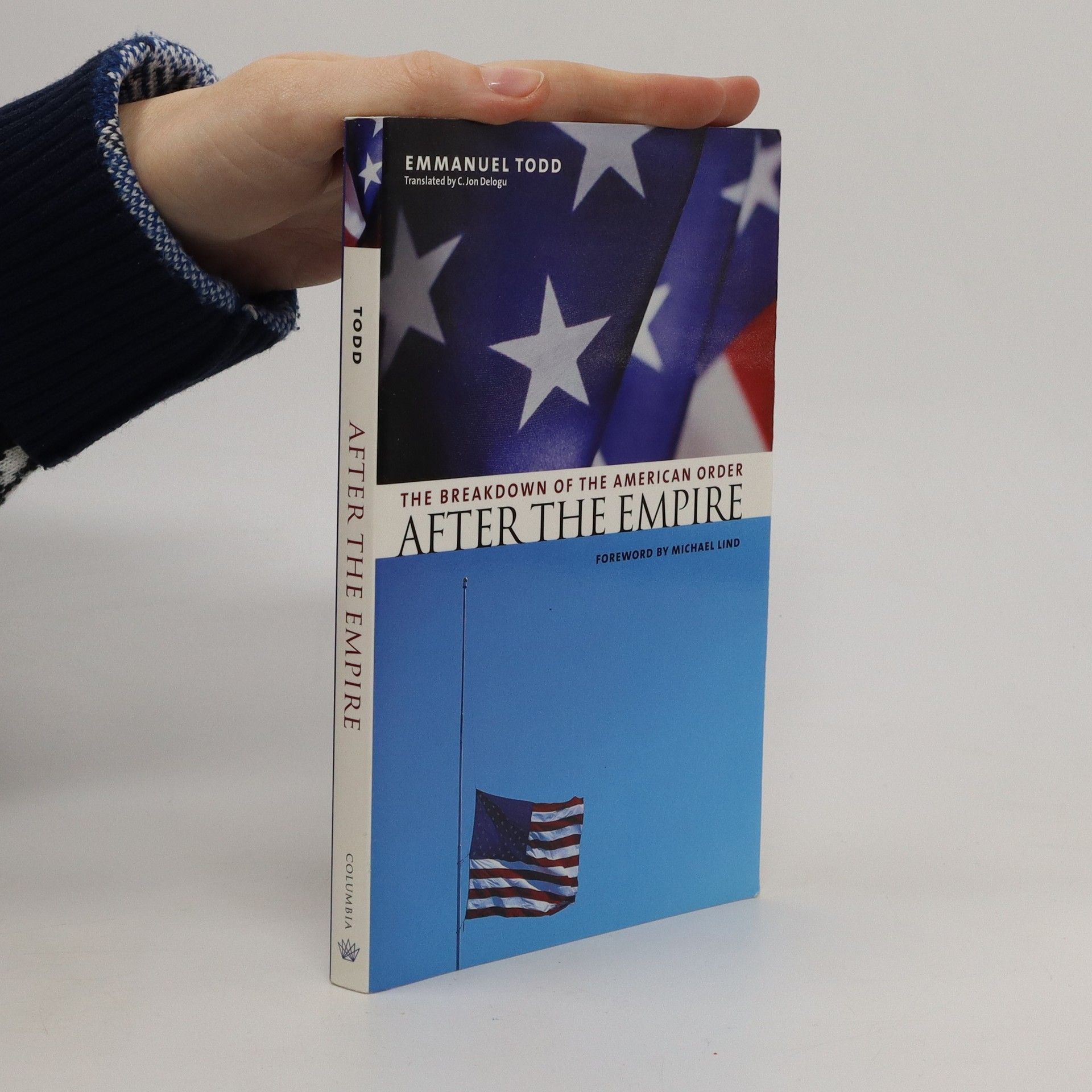Porážka Západu
krize ekonomiky, kultury a náboženství
Emmanuel Todd is a French historian, anthropologist, and sociologist whose research examines family structures worldwide and their connections to belief systems, ideologies, and political structures. He investigates how historical events have shaped these patterns and how they are reflected within them. Todd's work offers a unique lens on global cultural and political phenomena through the prism of family dynamics. His analyses uncover profound links between personal lives and the broader societal processes that drive human development. His scholarship is crucial for understanding how societies form and transform on a global scale.






krize ekonomiky, kultury a náboženství
Emmanuel Todd, ein angesehener Historiker und Anthropologe, prognostiziert den Niedergang der westlichen Welt, bedingt durch kulturellen und religiösen Verfall sowie wirtschaftlichen Rückgang. Die Krise Russlands nach der Sowjetunion führte zu einem Vakuum, das auch die USA und den Westen erfasste, während Russland sich stabilisierte.
"A leading anthropologist and historian places current controversies about sex and gender in the long history of the male/female relationship"-- Provided by publisher
In many developed countries, confusion about the contemporary state of the world is palpable. What was once taken for granted is now being questioned, prompting a desire to understand our current situation and future trajectory. In this insightful work, leading sociologist Emmanuel Todd sheds light on our predicament by reconstructing the historical dynamics of human societies from the Stone Age to today. He moves away from attributing special significance to the economy and instead offers an anthropological perspective, emphasizing the long-term dynamics of family systems and their connections to religion and ideology. This approach contrasts the unconscious societal level with the conscious realms of economy and politics. Todd also examines the transformative impact of education, which helps explain the varied historical paths of advanced nations and their increasing divergence. This divergence is evident in phenomena such as the rise of the Anglosphere, the dual nature of Homo americanus, Donald Trump's electoral success, and the contrasting ambitions of Germany and China. Additionally, he explores the emergence of stable authoritarian democracy in Russia, Japan's new introversion, and recent turbulent events in Europe, including Brexit. Todd's analysis highlights that today's massive transformations are more influenced by deep-rooted ethnic diversity than by the homogenizing effects of globalization.
Eine Geschichte der Menschheit von der Steinzeit bis zum Homo americanus
Familienstrukturen sind der unbewusste Motor der Geschichte. Von dieser bahnbrechenden Erkenntnis aus erzählt Emmanuel Todd die Geschichte der Menschheit neu: Vom frühen Homo sapiens, der in Kleinfamilien lebte, über die großen Kulturen des Altertums mit ihren immer komplexeren Großfamilien bis zur Rückkehr des Homo americanus zur Kernfamilie der Steinzeit. Wer die Lage der Menschheit zu Beginn des 21. Jahrhunderts verstehen will, sollte dieses luzide Buch des großen französischen Querdenkers lesen. Westliche Waren und Lebensstile dringen bis in die letzten Winkel der Welt vor, und doch sind wir von einer globalen Einheitskultur weit entfernt. Emmanuel Todd zeigt, wie sich seit der Steinzeit unterschiedliche Familiensysteme verbreitet haben, die bis heute die Mentalitäten zutiefst prägen. Er beschreibt die Dynamik der amerikanischen Gesellschaft mit ihren primitiven Kleinfamilien und die Unbeweglichkeit von Kulturen mit hochkomplexen patriarchalischen Großfamilien, und er erklärt den europäischen Konflikt zwischen einer deutschen Stammfamiliengesellschaft und Gebieten mit egalitären Familienstrukturen. Wo diese tief verankerten Unterschiede bei der Lösung der gegenwärtigen Krisen nicht berücksichtigt werden, da gerät die Demokratie unter die Räder. «Unsere Moderne», so Todd, «erinnert an einen Marsch in die Knechtschaft.»
英国EU離脱とトランプ旋風は、英米という発祥地でのグローバリズムの終焉と「国家」への回帰を意味する。家族構造の変遷が明らかにする「国家」の重要性。未来は歴史から見えてくる!
In the wake of the attack on the offices of Charlie Hebdo in Paris on 7 January 2015, millions took to the streets to demonstrate their revulsion, expressing a desire to reaffirm the ideals of the French Republic: liberte, egalite, fraternite.
Die Anschläge von Paris und die Verlogenheit des Westens
Mittwoch, 7. Januar 2015: Zwei Maskierte dringen in das Büro des Satiremagazins Charlie Hebdo ein und schießen einen Großteil der Redaktionsmitglieder nieder – als Rache für Mohammed-Karikaturen. In den folgenden Tagen verkünden Millionen solidarisch "Ich bin Charlie". Der französische Soziologe Emmanuel Todd gehörte nicht zu diesen Charlies. Sein provozierender Befund: Unter dem Deckmantel eines Kampfes für die Freiheit haben sich Demokraten und Antidemokraten untergehakt, um gegen den Islam zu demonstrieren. Nicht um die Freiheit generell ging es, sondern um die Freiheit, den Islam zu verhöhnen. Diese These bildet den Auftakt dafür, eine höchst aufschlussreiche Landkarte der aktuellen politischen Mentalitäten in Frankreich und Europa zu zeichnen. Fremdenhass, Europa-Skepsis, autoritäre Politikvorstellungen, Putin-Verehrung, Israel-Kritik und Amerika-Feindschaft: Das sind die Zutaten, die je nach Region und religiöser Prägung ganz unterschiedliche gefährliche Mischungen ergeben. Emmanuel Todd zeigt, welche wirtschaftlichen und sozialen Faktoren die Demokratie an den Rand des Abgrunds führen, und ruft dazu auf, zu den wahren Werten von Freiheit, Gleichheit und Brüderlichkeit zurückzufinden. Seine luzide Analyse ist dringend überfällig: Selten wurde uns so scharfsichtig, so schonungslos und so überraschend der Spiegel vorgehalten.
Quarante ans de discours économique du Front national passés au crible. Suivi d'un entretien avec Emmanuel Todd
"Pauvres actionnaires !". C'est sans ironie que, en 1986, les dputs Front national lanaient ce cri d'alarme. Jean-Marie Le Pen s'autoproclamait alors le "Reagan franais", adepte d'une "rvolution fiscale" qui supprimerait l'impt sur le revenu, pourfendeur de "l'tat Kapo" et des "perversions de l'tatisme". Sa fille Marine Le Pen raconte aujourd'hui le contraire et s'en prend "aux marchs financiers, aux milliardaires qui dtricotent notre industrie et jettent des millions d'hommes et de femmes de notre pays dans le chmage, la prcarit et la misre. Oui, il faut en finir avec le rgne de l'argent-roi". Depuis quand, se demande Franois Ruffin, un peu embt, depuis quand le Front national cause comme a, un peu comme lui Qu'est-ce qui relve de l'imposture, ou du vernis social Qu'est-ce qui, l'inverse, est profondment ancr dans le discours du FN Pour y rpondre, l'auteur a plong dans quatre dcennies de littrature frontiste. Citant les professions de foi et les tracts du FN depuis sa fondation, il passe les thmes en revue : "Etat", "impts", "service public", "entreprise", "Europe", "mondialisation", "ingalits". Une recherche mene sans hystrie ni complaisance.